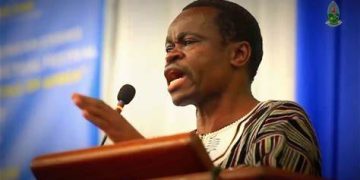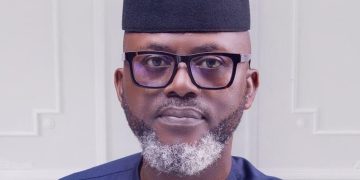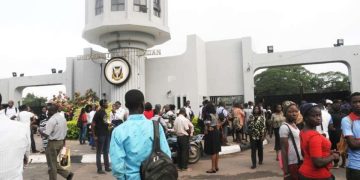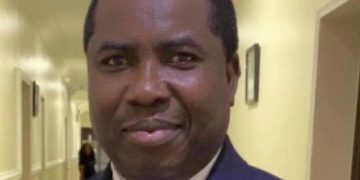Professor Patrick Loch Otieno Lumumba, former Director of the Kenyan Anti-Corruption Commission, and Director of Kenyan School of Law, has said Africa cannot be great if Nigeria is not great. He shared this opinion during a lecture titled ‘Democracy in Africa: The Legacy of Abdulsalami Abubakar,’ organised by The Leadership Scorecard Integrated in Abuja in honour of former Head of State, General Abdulsalami Abubakar, who returned Nigeria to democratic rule in 1999.
He opined that those who have the honour and privilege of serving their country must only have one agenda which is that they must be trustees of the things that they are entrusted with.
He added that those who have the honour and privilege of serving their people will go out there and will be prepared to say that they are prepared to lay down their lives for the benefit of the people.
Lumumba stated that in true democracy, the people want to be told that if there is agriculture, it will be supported and they be able to deliver that they can feed themselves.
He explained that the in true democracy, the people want to be told that they will have good health system so that when they are sick, they will go to hospitals that are hospitals in the true sense of the word and not hospitals built for them and their leaders running away to different parts of the world to seek better medical care.
Lumumba also said the people would not want to see their education system being an education system prepared for them and then the children of those whom they have elected going to different parts of the world.
He disclosed that the people would want to ensure that they have power, particularly the younger generation, they want to ensure that they are enjoying the dividends of artificial intelligence, that governance facilitates them and makes them inventors and innovators and create for them, an environment where they can thrive.
Lumumba asserted that if the aforementioned were not done, young men and women of the continent will be dying in the Mediterranean Sea; they will be humiliated at embassies of foreign countries and those who have the opportunity will run away to go and be engineers in different parts of the world.
He added that if true democracy is not practiced in Nigeria, the young men and women will not have faith in their country and would want to acquire the passports of different countries and will not be proud of democracy.
Lumumba told Abubakar that the democracy he cherished, the democracy he keeps talking about and walking around Africa for, is the democracy that promises Africans that Africa can be great again.
“And Africa must be great again. And Africa will never, ever be great, I submit to you Nigerians, if Nigeria is not great,” Lumumba said.
Explaining the rationale behind his submission, Lumumba said he arrived at the conclusion because with the population of over 300 million, if Nigeria can be made into a market, who can confront the continent of Africa.
“Who can ignore the continent of Africa? Tell me, where in the world do you not find a Nigerian? Somebody once told me that if you go to any place in the world and you do not find a Nigerian, run away from there because there is nothing to be done in that place.
“I am suggesting that the democracy of Nigeria will only begin to have meaning when Nigeria provides leadership.
“The time is now. As we celebrate democracy in Africa today, I am calling upon Nigeria and Nigerians to rise to the occasion, rise up so that your politics will be a point of reference so that when we watch men and women in the Senate in Nigeria and in the House of Representatives in Nigeria and we watch them debate, they will be debating about the things that relate to Africa; they will be debating about Africa Agenda 2063, they will be debating about Africa Continental Free Trade Area, they will not demand of anybody that wants to come to Nigeria who is an Africa must have a visa. No! Nigeria being as big as it is, should be the welcoming big brother because when you do that, we follow your leadership.
“We want to see a Nigeria that is economically dominant because if Nigeria is strong, then the test of Africa is strong,” Lumumba also said.
Lumumba further said when he hears occasionally Nigeria saying that it is the second largest and first largest economy in Africa sometimes, he wasn’t impressed because when Nigeria had a GDP of 500 billion, he is not impressed.
According to Lumumba, Nigeria “should have a GDP of $10 trillion then I will be impressed.”
He asserted that this is possible because Nigeria has the human resources and the intellectual wherewithal to ensure that it happens.
“When I hear Nigeria saying that they generate anything between 5,000 and 10,000 megawatts of electricity, I am not impressed. I am not impressed because little Denmark generates 35,000 megawatts of electricity and if Nigeria is to earn the dividends of democracy through industrialisation, Nigeria must now get and embark in the serious business of ensuring that Nigeria has energy to propel not only her and her neighbour, but the continent of Africa into the fourth industrial revolution. Those are the dividends of democracy,” Lumumba stated.
Lumumba added that he wants to hear that Nigeria is successful because Nigeria can be the defender of democracy in Africa and he wants to hear that when the leaders of Nigeria go to different parts of the world, they are treated with respect because Nigeria has demonstrated economically, politically and diplomatically that they are the dividends of democracy.
“I want to see that when one carries a Nigerian passport, but I hope that there will be an African passport, that our passport will be respected throughout the world. I look forward to those days,” Lumumba hoped.
In his remarks, Abubakar expressed profound gratitude to the management of Leadership Scorecard Integrated for organizing the important public lecture.
Abubakar said their dedication to promoting dialogue on leadership and democracy is commendable and essential for the nation’s continued progress.
He thanked Professor Lumumba, whom he said his work and passion for the advancement of democracy in Africa are truly inspiring, saying that Lumumba’s presence underscored the importance of Africans’ shared commitment to building a better future for the continent.
Abubakar also said he was deeply humbled by the recognition of his contributions and remained steadfast in his belief that “Africa’s best days are ahead of us.”
“Together, let us forge a legacy of democratic excellence that will inspire generations to come. to come,” Abubakar said.
Reflecting on the journey towards 25 years unbroken democracy in Nigeria, Abubakar said when he assumed office as the Head of State of Nigeria in June 1998, the nation was at a critical juncture in its chequered history.
Abubakar also said the preceding years had been marked by political turbulence and a yearning for democratic restoration.
He added that the path ahead required not only a vision, but also decisive and principled leadership to navigate the complexities of our national landscape.
“Throughout history, the smooth transfer of power is often celebrated as a significant achievement, yet it marks only the start of a more extensive journey. Personally, I found it crucial to establish a foundation for enduring democratic governance. This entailed nurturing an atmosphere of trust, inclusivity, and adherence to the rule of law. Our administration promptly undertook measures such as releasing political prisoners, lifting restrictions on political activities, and developing an electoral system designed to guarantee free, fair, and transparent elections.
“Our efforts culminated in the successful conduct of the 1999 general elections, which saw the peaceful transfer of power to a democratically elected government. This moment was not merely a milestone for Nigeria, but a beacon of hope for the entire African continent. It demonstrated that with the right leadership, even the most challenging political landscapes could be transformed,” Abubakar also said.
The former Head of State further said he was deeply honoured to be recognized in this manner, but must emphasize that the work of sustaining peace and promoting democracy is a collective effort that requires the commitment and collaboration of all stakeholders.
“Throughout my tenure as the Military Head of State of the Federal Republic of Nigeria, and in the years that have followed, I have strived to uphold the principles of peace, stability, and democratic governance.
“However, the journey towards democratic consolidation does not end with elections. It requires continuous nurturing and unwavering commitment to the principles of good governance, rule of law, and respect for human rights. As leaders, we must remain vigilant against the encroachment of autocracy and corruption, which threaten the very foundations of our democracies.
“Astute leadership is characterised by the ability to inspire trust, foster unity, and drive development through accountable governance. It demands that we listen to the voices of our citizens, embrace transparency, and uphold justice. In this regard, I have always believed that leadership is not about wielding power, but about serving the people with integrity and dedication. Leaders must fulfil promises they made. Unfulfilled promises bring mistrust and contempt.
“In line with these ideals, I established the Abdulsalami Abubakar Institute for Peace and Sustainable Development Studies in 2002, shortly after transitioning to a democratic government. The Institute addresses the need for innovative, Afro-centric approaches to conflict transformation and development. Its mission is to provide a platform for local, national, and global actors towards promoting peace, security, and development in Africa. The Institute is dedicated to advanced research, dialogue, education, and training in conflict resolution, peacebuilding, environmental sustainability, good governance, and sustainable development.
“Reflecting on the broader African context, we have witnessed remarkable strides in democratic 80vernance across the continent. Countries that once grappled with authoritarian regimes are now flourishing democracies, contributing to regional stability and prosperity, This progress is a testament to the resilience and determination of our people, as well as the transformative impact of visionary leadership.
“Yet, challenges remain. We continue to confront issues such as poverty, inequality, and insecurity, which can undermine our democratic gains. Addressing these challenges requires collaborative efforts and innovative solutions. It is imperative that we strengthen our institutions, invest in education and healthcare and create opportunities for our youths,” Abubakar further said.
Abubakar added that the legacy of astute leadership and the sustenance of democracy in Africa is a collective endeavour.
“It is a journey that requires the dedication of not only our leader, but also every citizen. As we look to the future, let us reaffirm our commitment to building a continent where democracy thrives, and every individual can achieve their full potential.
“Furthermore, we must recognize the critical role of education and economic empowerment in sustaining democracy. A well-informed and economically stable populace is less susceptible to manipulation and more likely to engage constructively in the democratic process,” Abubakar stated.
In attendance were Borno State Governor, Babagana Umara Zulum; Emeritus Catholic Archbishop of Abuja, John Cardinal Onaiyekan; former President of the Nigerian Bar Association and Labour Party Governorship Candidate in Edo State, Olumide Akpata; former Senator representing Kaduna Central Senatorial District, Senator Shehu Sani, amongst others.
























